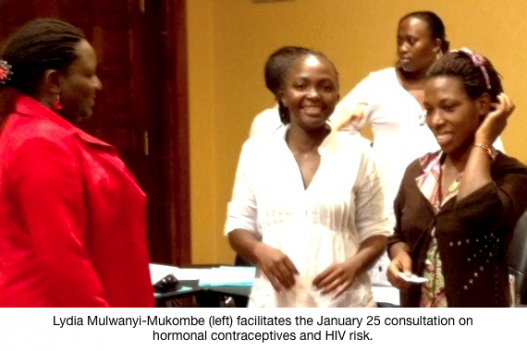top

On January 25, more than 40 women—representing HIV prevention advocates, reproductive health service providers and women living with HIV from across Africa—met in Kampala, Uganda to review and discuss the existing data on hormonal contraceptive use and HIV risk. The meeting was convened by the International Community of Women Living with HIV/AIDS East Africa (ICW-EA) and AVAC. Drs. Nelly Mugo and Edith Nakku-Jaloba, of the Partners in Prevention trial team, gave an overview of recent data. Lydia Mulwanyi-Mukombe, a 2012 AVAC HIV Prevention Research Advocacy Fellow, who will be tracking women’s perceptions of and questions on HIV and hormonal contraceptives as part of her fellowship, led an interactive capacity-building exercise on key terms in reproductive health and family planning. One goal of the meeting was to develop a women’s civil society statement, which was presented at a World Health Organization consultation on hormonal contraceptives and HIV risk held January 31-February 2 in Geneva, Switzerland. Lillian Mworeko, head of ICW-EA, Alliance Nikuze, AVAC Fellow 2010, and AVAC Senior Program Manager Deirdre Grant attended and carried women’s voices forward to the discussion. A statement of the meeting outcome is expected in February, and AVAC will hold an advocates’ call to discuss the developments as they emerge. Details of the call will be released on the AVAC Advocates’ Network—subscribe here.
Background Facts: Data from one recent trial suggested that injectable contraceptive use increased women’s risk of acquiring or transmitting HIV by twofold, compared to women using non-hormonal methods of family planning. There are mixed data on this issue, and while the most recent data are cause for concern, they are not conclusive.